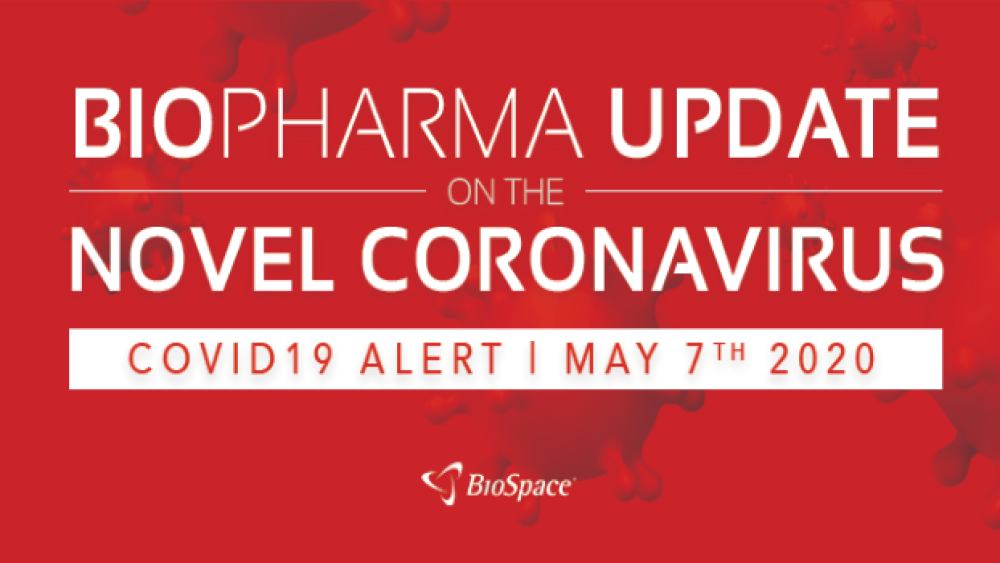Please check out the biopharma industry coronavirus (COVID-19) stories that are trending for May 7, 2020.
News information is not all-inclusive. Please check back for updates.
FDA Actions
Immediate In Effect Guidance: The FDA provided guidance to help assist manufacturers in providing FDA informative, timely information about changes in production of certain medical device products. This will help the FDA prevent or mitigate shortage during the COVID-19 pandemic. On May 11, the FDA will host a webinar for more information.
Diagnostics Update: The FDA has worked with more than 385 test developers who plan to submit EUA requests to detect COVID-19. Also, 60 individual EUAs have been issued. In addition, 25 authorized tests have been added to the EUA letter of authorization for high complexity molecular-based laboratory developed tests (LDTs). The FDA has been notified that more than 240 laboratories have begun testing under the policies set forth in its COVID-19 Policy for Diagnostic Tests for Coronavirus Disease-2019 during the Public Health Emergency Guidance.
Diagnostics
Sherlock Biosciences received EUA for its Sherlock CRISPR SARS-CoV-2 kit to detect the COVID-19 virus. It provides results in about one hour.
Thermo Fisher Scientific announced the SARS-CoV-2 GlobalAccess Sequencing Program for research groups battling the spread of the pandemic globally. Under the program, the company will provide 50 units of the Ion Torrent Genexus System at a subsidized price to support global collaborative COVID-19 research. Access to such data can accelerate researchers’ understanding of how the virus is evolving, assist with contact tracing and transmission interruption efforts, and inform vaccine development programs, the company said.
Testing Therapies, Antivirals and Vaccines
Moderna received approval from the FDA to begin Phase II testing of its COVID-19 vaccine candidate. Moderna said it expects to begin the mid-stage study soon with 600 patients and is finalizing protocols for a hoped-for Phase III study mRNA-1273, which is expected to begin in the early summer of 2020.
Ansun Biopharma takes aim at COVID-19 with an experimental influenza treatment. San Diego-based Ansun Biopharma used its influenza research data to dive into attempts to develop a treatment for COVID-19 using an investigational nebulized enzyme asset as a potential treatment for severely infected patients.
Evelo Biosciences is launching a Phase II trial of its investigational therapy, EDP185, for the treatment of patients with early diagnosis of COVID-19. The drug, originally developed for psoriasis, showed efficacy in a Phase Ib trial in blunting the production of multiple inflammatory cytokines – the same kind that many serious COVID-19 patients are dealing with.
CalciMedica announced the Independent Safety Review Committee (ISRC) recommended its open-label Phase II trial of CM4620-IE in patients with severe COVID-19 pneumonia continue as planned. CM4620-IE is a potent and selective small-molecule CRAC channel inhibitor that prevents CRAC channel overactivation. The trial aims to enroll 120 patients with COVID-19 pneumonia on oxygen therapy.
Company Actions
As reported by the Houston Business Journal, two Houston-based biotech companies had securities trading temporarily halted as the SEC raised questions on claims made by the companies regarding COVID-19 treatments. The SEC halted trading on May 1st for both Moleculin Biotech Inc. and CNS Pharmaceuticals Inc. Questioning relates to the drug candidate WP1122.
The Allergan Foundation has fast-tracked another $2 million dollars in charitable grants for community organizations responding to the COVID-19 pandemic. The new grants double The Allergan Foundation’s total COVID-19 donations to date, raising the total to $4 million. The donations are dedicated to 57 organizations working on the front lines of the community response to the pandemic in New York, New Jersey, California, Texas, Ohio, Florida and internationally.
Knockdown Coronavirus is an initiative started by two biotech companies with the goal of developing a treatment for COVID-19. The two companies, AUM LifeTech, Inc. and AUM BioTech LLC are offering self-delivering RNA silencing research products to the global coronavirus research community to facilitate research and fast track therapeutic development.
As reported by the Milwaukee Business Journal, FluGen, a company working on a COVID-19 vaccine raised $8.1 million in new financing.
Other Industry News
Evidence is mounting that COVID-19 is crowding out non-COVID-19 healthcare and drug development. Some of it is related to biopharma companies shifting resources toward COVID-19-related projects and stalling clinical trials for other programs, but some of it is also caused by patients’ concerns over going to the doctor or a hospital.
University College of London researchers analyzed the genomes from more than 7,500 people with COVID-19 and characterized diversity patterns in the viral genome, which could provide leads for drugs and vaccines. They identified almost 200 recurrent genetic mutations in the virus, suggesting ways in which it might be adapting to humans.
University of Saskatchewan scientists discovered how bats can carry the Middle East respiratory syndrome (MERS) coronavirus without getting sick. Bats have particularly strong immune systems, allowing many viruses to survive but not kill the bats. In turn, that tends to select for stronger viruses so that when they do jump from bats to other vectors, such as humans, they’re often very dangerous. Also, in bats, coronaviruses don’t appear to cause inflammation-causing proteins as they do in humans but maintain a natural antiviral response, which typically shuts down in other species. The result is the MERS virus stays in the bat for months but is harmless unless the bat’s immune system is compromised by environmental conditions or disease.
As the mortality figures for COVID-19 continued to rise, people are wondering where they will stop. The actual death toll for COVID-19 won’t be calculable for some time, but there are early indications that it may be significantly lower than calculations of deaths per confirmed cases lead one to believe.





